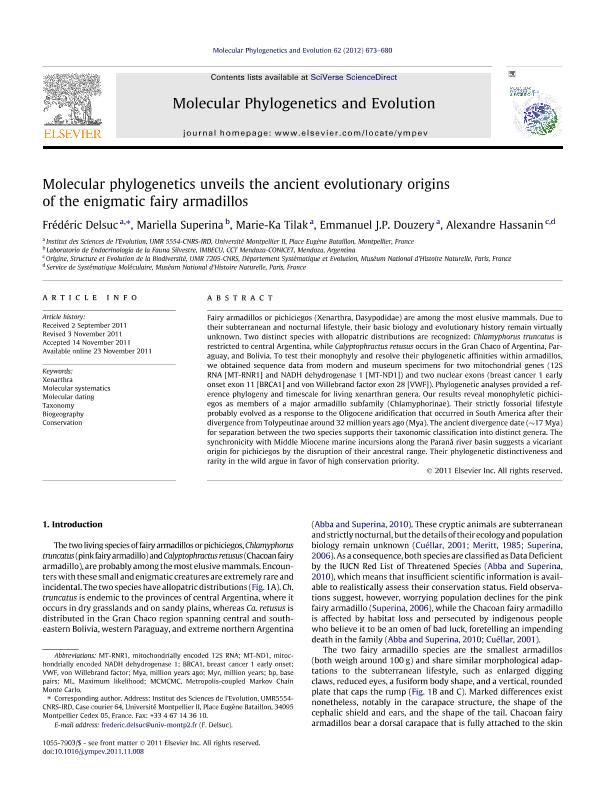Artículo
Molecular phylogenetics unveils the ancient evolutionary origins of the enigmatic fairy armadillos
Delsuc, Frédéric; Superina, Mariella ; Tilak, Marie-Ka; Douzery, Emmanuel J. P.; Hassanin, Alexandre
; Tilak, Marie-Ka; Douzery, Emmanuel J. P.; Hassanin, Alexandre
 ; Tilak, Marie-Ka; Douzery, Emmanuel J. P.; Hassanin, Alexandre
; Tilak, Marie-Ka; Douzery, Emmanuel J. P.; Hassanin, Alexandre
Fecha de publicación:
02/2012
Editorial:
Academic Press Inc Elsevier Science
Revista:
Molecular Phylogenetics and Evolution
ISSN:
1055-7903
Idioma:
Inglés
Tipo de recurso:
Artículo publicado
Clasificación temática:
Resumen
Fairy armadillos or pichiciegos (Xenarthra, Dasypodidae) are among the most elusive mammals. Due to their subterranean and nocturnal lifestyle, their basic biology and evolutionary history remain virtually unknown. Two distinct species with allopatric distributions are recognized: Chlamyphorus truncatus is restricted to central Argentina, while Calyptophractus retusus occurs in the Gran Chaco of Argentina, Paraguay, and Bolivia. To test their monophyly and resolve their phylogenetic affinities within armadillos, we obtained sequence data from modern and museum specimens for two mitochondrial genes (12S RNA [MT-RNR1] and NADH dehydrogenase 1 [MT-ND1]) and two nuclear exons (breast cancer 1 early onset exon 11 [BRCA1] and von Willebrand factor exon 28 [VWF]). Phylogenetic analyses provided a reference phylogeny and timescale for living xenarthran genera. Our results reveal monophyletic pichiciegos as members of a major armadillo subfamily (Chlamyphorinae). Their strictly fossorial lifestyle probably evolved as a response to the Oligocene aridification that occurred in South America after their divergence from Tolypeutinae around 32 million years ago (Mya). The ancient divergence date (~17. Mya) for separation between the two species supports their taxonomic classification into distinct genera. The synchronicity with Middle Miocene marine incursions along the Paraná river basin suggests a vicariant origin for pichiciegos by the disruption of their ancestral range. Their phylogenetic distinctiveness and rarity in the wild argue in favor of high conservation priority.
Archivos asociados
Licencia
Identificadores
Colecciones
Articulos(IMBECU)
Articulos de INST. DE MEDICINA Y BIO. EXP. DE CUYO
Articulos de INST. DE MEDICINA Y BIO. EXP. DE CUYO
Citación
Delsuc, Frédéric; Superina, Mariella; Tilak, Marie-Ka; Douzery, Emmanuel J. P.; Hassanin, Alexandre; Molecular phylogenetics unveils the ancient evolutionary origins of the enigmatic fairy armadillos; Academic Press Inc Elsevier Science; Molecular Phylogenetics and Evolution; 62; 2; 2-2012; 673-680
Compartir
Altmétricas



